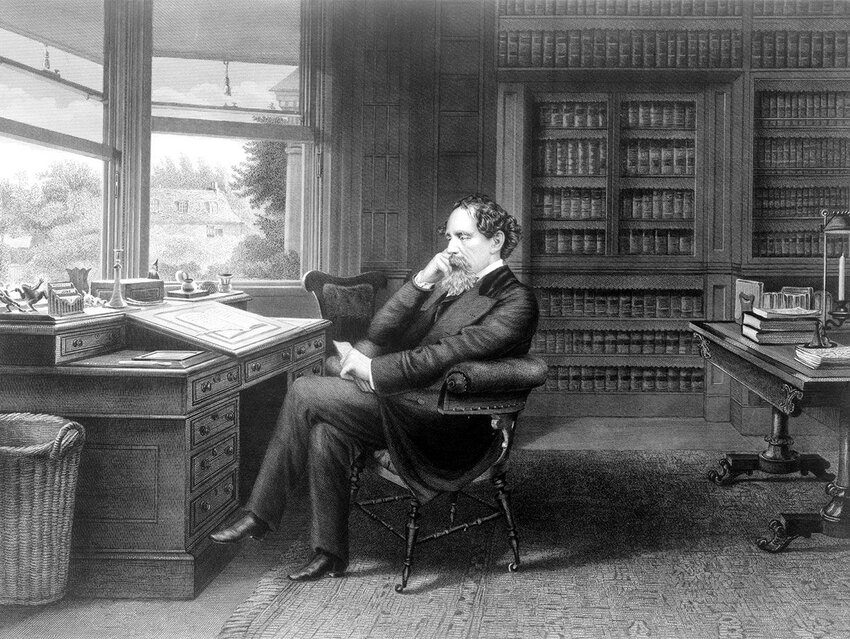Known for penning works such as A Christmas Carol (1843) and Oliver Twist (1838), Victorian-era writer Charles Dickens is also credited with inventing a slew of interesting words. He’s so influential that the word “Dickensian” was coined in his honor, meaning “of or reminiscent of the novels of Charles Dickens.” While “Victorian” suggests the prudishness and high moral tone on display during that queen’s reign, the adjective “Dickensian” connotes the poor social conditions in Dickens’ novels, or perhaps even the comically repulsive characters, such as master thief Fagin in Oliver Twist.
For all the accolades heaped upon his works, it does seem that Dickens has been falsely credited with inventing some common words, including “boredom,” “flummox,” and “butter-fingers.” While he did popularize them, there is evidence of earlier records by other authors. However, this does prove that Dickens sought out unique and lesser-known words, further exemplifying his expertise in the English language and leaving a lasting mark on the lexicon. Let’s take a look at some Dickensian words that the author did invent.
Sassigassity
This is one word that deserves a comeback. Apparently, this word was employed only once, and by its inventor. According to Dickens, “sassigassity” means “audacity with attitude.” It was published in 1850 in “A Christmas Tree,” in the line “…the sassigassity of that dog is indeed surprising…”
Messiness
“Messiness,” a derivation of “messy” (“untidy” or “dirty”), can be credited to Dickens. It’s a result of converting an existing adjective into a noun, something Dickens was famous for. Aside from “messiness,” it’s believed he also coined “cheesiness,” “fluffiness,” and “seediness” from the respective nouns.
Sawbones
Dickens came up with this slang term in The Pickwick Papers in 1837, and described it thusly for readers: “I thought everybody know’d as a sawbones was a surgeon.” We don’t see this word often, but it is still listed in the dictionary as an informal term for a doctor or surgeon.
Whizz-bang
“Whizz-bang” was used in The Pickwick Papers to describe the sound of a gunshot. Today, a “whizz-bang” (or “whiz-bang”) refers to a resounding success, as in, “She ran a whizz-bang campaign.” During WWII, it had a meaning closer to how Dickens used it, as a small-caliber shell.
Comfoozled
Dickens invented this word to mean “exhausted” or “overcome,” as seen in The Pickwick Papers: “He’s in a horrid state o’ love; reg’larly comfoozled, and done over with it.” This is not to be confused with the relatively new word “confuzzled,” which is a portmanteau of “confused” and “puzzled.”
Mildewy
While Dickens often turned adjectives into nouns, he was also known for adding suffixes to nouns to create a new adjective. Case in point: the word “mildewy,” which was first recorded in The Pickwick Papers as an adjective, and was used later in A Tale of Two Cities (1859) to describe “the mildewy inside of the coach.” This is consistent with the modern usage to describe something moldy or affected by mildew. While he didn’t coin the original nouns, Dickens was known to create other new adjectives by adding the suffix “-y” to nouns, including “bulgy,” “swishy,” “soupy,” “waxy,” and “trembly.”
Jog-trotty
Dickens went one step further with the noun “jog-trot” when he transformed it into an adjective with an entirely new meaning. “It’s rather jog-trotty and humdrum. But it’ll do as well as anything else!” wrote Dickens in Bleak House (1852). Traditionally, a jog-trot is a slow trot (commonly seen in horses), but Dickens transformed it into an adjective to describe something that is boring or dull. It seems that this was a one-off creation, never to be seen again in other works.
Featured image credit: Epics via Getty Images

